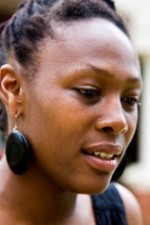 The ego is a powerful and dangerous thing. Consumers of art often want to directly associate a piece of writing with the person who created it, and often they're correct to do so. Much of American poetry has had a strong confessional bent for a couple of centuries now, and plenty of poets have exploited that aspect of the work, sometimes to their detriment. Nandi Comer, on the other hand, makes anonymity an art. She is a close observer, layering details of the scenes she creates with tenderness and care. Reading a poem by Comer makes me feel as though I'm staring at a faded snapshot that gradually invades my mind, until I feel myself to be by her side, watching life unfold. By muting her own presence in her poems, Comer helps her reader to be similarly open to a larger view of humanity. Read this woman. Watch for her. She'll take you places you've never been and make them feel like home. * How Not to Lose the Mask: Mil Mascaras Showers after a Match Masked wrestlers will go pretty far to avoid being ` identified and seen without their mask by fans. -Rey Mysterio, Behind the Mask Through the locker room, past the champion posters, past the black and white TV monitor, in the last shower stall, Mil Mascaras feels the weight of his arms and sinks. The tenderness of biceps, the pull of hamstrings, each sore muscle cooled by a cement bench. While other fighters vacate the locker room, he waits for the shower to warm. He loosens each tight loop laced up his white boot, wonders how many blows his back has taken, how many slaps across his chest. Still ringside, clusters of boys grip tattered autographs and wait for a glimpse of eyebrow, for the faintest ridge of nose. Mil Mascaras slips each leg out of spandex, cuts tape There are better times to leave the embroidered M boxed at home: movie theaters, weddings grocery shopping. One time while a cashier dragged his cans and bottles across a beeping scanner, he studied her bored mouth, how her brow collected in the middle of her head as he faced her. She barely looked in his direction. Water puddles at the drain. He steps under the trickling tap. Lukewarm spray wets his threaded cheek, runs over each stud. His eyelets upturned accept the shower No. She never recognized him, even as he peered into her face, even after he signed his credit card receipt. * Nandi Comer is currently pursuing an MFA in Poetry and an MA in African American and African Diaspora Studies at Indiana University. She has received a Vera Meyer Strube Poetry Prize, Crab Orchard Review’s Richard Peterson Poetry Prize, as well as fellowships from Cave Canem, Virginia Center for the Creative Arts and Callaloo. Her poems have appeared or are forthcoming in Another and Another: An Anthology From the Grind Daily Writing Series (Bull City Press, 2012), Cave Canem Anthology XII (Willow Books 2012), Callaloo, Crab Orchard Review, Sycamore Review, and Third Coast. 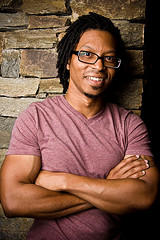 Nathan McClain is probably the poet on the list with whose current work I'm most familiar. He is a great supporter of other poets' work, including mine, and our friendship emerged from our ongoing conversations about poetry. The quality I find most admirable in Nathan's poems is how he manages to create abiding, sustained ache. His speaker never grandstands, and never indulges in self-pity – on the contrary, his discursive interrogatives often implicate him in his own sadness. Nathan accomplishes this using understated language, a quiet voice that knows sorrow well, and accepts it. Few poets have the courage to enter that place and stay there – I think of Larry Levis as one, and Carl Phillips, often – but it's fundamental to good writing: to look and speak clearly, even when it comes to pain. Please enjoy. * Houdini Who would’ve known you’d grow so afraid of stillness, enclosed spaces, that you’d no longer remember a time you weren’t subtracting seconds from your life, as if each breath were held? If you had the strength to pluck your lucky quarter from behind your wife’s ear, would you have? Would she still laugh? A teakettle boils on the stove, its steam enough to unlock your lungs. Your wife reads from Robinson Crusoe, whom you cannot help but dream of, enveloped by endless miles of ocean. Outside, paper skeletons are strung up on every house in your neighborhood. You hear a boy skipping up and down the block, begging his mother, for Halloween, Mom, can I please be a ghost, please? * Nathan McClain holds an MFA in Creative Writing from Warren Wilson College. His poems have recently appeared or are forthcoming in The Collagist, Weave, Quarterly West, The Journal, Nimrod, Toad and Best New Poets 2010. A recipient of scholarships from Vermont Studio Center and The Bread Loaf Writers' Conference, he currently lives and works in New York. 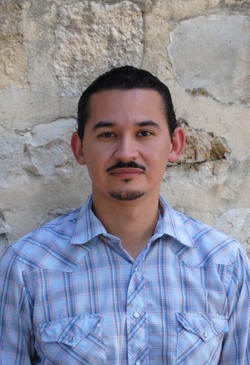 A successful writer knows how to bridge the gap between the individual and the greater world. Among the more common flaws in novice poets' work are obscurity and self-absorption, a lack of connectedness and empathy that prevents their poems from truly resonating with a reader. This kind of writing can be seen in workshops and open mics everywhere: it's a stage of development many of us traverse, and some never transcend. One of the things I love about Tomás Morin's poems is his quality of attention, his concern with larger questions and happenings. Morin has a roving, eager intellect, and his work is sophisticated without being solipsistic. This is evident in Morin's careful rendering of detail: in his eye towards his surroundings, and in the way he patiently guides a reader through a landscape, he demonstrates himself to be a devotee of empathy. It's a pleasure to read work that's so generous, and so thoroughly humane. The poem below previously appeared in Literary Imagination. * Winter after Abel Grimmer There is a church with a steeple and houses whose roofs mirror the slope of the church’s roof which is meant to dominate the center of the canvas; such was the nature of faith in the sixteenth century. If you lose interest in the architecture the snow will always yoke you back in, as will the barren trees that make your eyes dart from one to the other in search of a nest, a bird, a remnant of a bird even, and when you fail to accomplish even this small task you will turn to the ice and the skaters because there is nothing else to turn to and because there is certainty in their movements, and this comforts you, the slicing of smooth spirals and the hand-holding and the red noses— only there are no skaters as you had once thought and now you are confused and all you can see are the people being beaten with clubs and branches from the trees you had worried over, and then you notice the empty lake in the background, the greater body of water in the frame, and you tell yourself the ice will crack, the snow melt, and this is something which makes you feel better because it is a scene you have witnessed before. * Tomás Q. Morín was the winner of the APR/Honickman First Book Prize for his poetry collection, A Larger Country. He is co-editor with Mari L’Esperance of the anthology, Coming Close: 40 Essays on Philip Levine. His poems have appeared in Slate, Threepenny Review, Boulevard, New England Review, and Narrative. He teaches literature and writing at Texas State University. 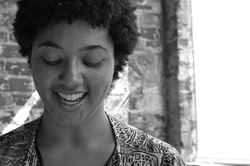 Writers have varying degrees of allegiance with the places they come from, and the places they call home. Someone peripatetic might become obsessed with a number of places, or an expatriate might spend her whole career looking back on the place of her upbringing. For other writers, locale seems to play only a nominal part in their work. Bianca Spriggs is not one of those writers. It's impossible to consider her body of work without also considering the South she calls home. Spriggs talks bourbon and drawl and history - she does it just a little durty, and she does it damn well. I got to know Spriggs when she invited me to participate in the Kentucky Women Writers' Conference in Lexington, but it wasn't until the Affrilachian Poets reading at AWP in 2011 that I got a chance to hear her work at length. She seriously impressed me that night: her work was clear without being simple, bold without being bombastic, with just the right tinge of mystery. And her command of narrative had me swooning. Spriggs' poems have the same subtle touch on the page. She takes great care with line, balancing and breaking brilliantly to round and coax a poem. When I read pieces like the one below, I feel like roads are opening up inside me, inviting me to new parts of myself – parts I'd forgotten – or never realized – were there. I hope she opens you up, too. * Alchemist The woman next door says she don’t have to ask if it was me or him rearranging the furniture last night. Don’t take that much to grow a man the way you want him. She tells me how all a woman had to do to snag her the right man or cure one from being a terror, was to scare up some nightshade. She says it used to be simpler when the world was simpler. Used to be in the South, you could find it just about anywhere on account of how liberal the law was with hanging men. You’d look for the mandrake right where he’d been hung and spasmed the last of his seed into the earth. But she doesn’t say, spasmed his seed. She says something else which means having an orgasm as you die. You had to harvest the plant before dawn on a Friday and you’d sometimes get a four-foot root already bulging into a homunculus. But she doesn’t say, homunculus. She uses a racial slur. Then it’d want feeding. Goat’s milk. Honey. Dried mushroom. Blood from a fresh cut. Eventually that little thing would come to life, start moving around, wail like an infant if it didn’t have its food. When it got adolescent-old you’d slit its throatroot because, after all, it’s just a plant. Dry it out. Grind it down. Serve it in tea to the man you’re wanting to do right and that was that. What do you do now, I want to know, if you don’t have a mandrake? She says, Find someone who do. I know where a whole mess of ‘em grow. * Affrilachian Poet and Cave Canem Fellow, Bianca Spriggs, is a poet and multidisciplinary artist based in Lexington, Kentucky. Bianca is the recipient of a 2013 Al Smith Individual Artist Fellowship in Poetry, multiple grants from the Kentucky Foundation for Women, and a Pushcart Prize Nominee. In partnership with the Kentucky Domestic Violence Association, she is the creator of The SwallowTale Project: creative writing for incarcerated women. Bianca is the author of Kaffir Lily (Wind Publications, 2010), How Swallowtails Become Dragons (Accents Publishing, 2011), and her work may be found in several anthologies including New Growth: Recent Kentucky Writings, and America! What's My Name?, as well as numerous journals including Reverie, Union Station Magazine, Appalachian Heritage, Caduceus, Alehouse, Tidal Basin Review, The Journal for Feminist Studies in Religion, The Louisville Review, Still, and Muzzle. She is currently the Managing Editor for pluck! The Journal of Affrilachian Art & Culture. You can learn more about her current and upcoming projects here: www.biancaspriggs.com. 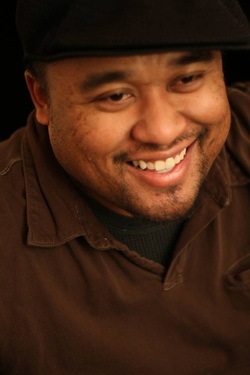 When I was living in Oakland a few years ago and regularly attending poetry slams, Jason Bayani was among my favorite poets to watch. His work could be boldly comic, which I loved, but more often, Bayani's poems were intricate, passionate love letters to the places and people important to him. I always found him to be an artist of great feeling. In the years since, Bayani has worked very hard to develop his craft. He is deft with technique, but one of the things I most admire about him – as an artist and a man – is his unwavering sincerity. Bayani never forgets who he is, and where he comes from, and there's immense power in that. I hope you'll agree. * KEIN/MUENCHEN These shoes were not made to walk in snow. I must have slipped on the ice seven times before eating it in the botanical garden. There are several ways to get “got” in a city. The prime offense is to always be looking up. I couldn’t help it though. I’ve never seen the street break form like this. Munich is so gutteral and heavy on the tongue. The buildings are an impractical math. I am relearning shape. The city where I love is a grid, a digital timepiece: bending and folding: in and out of space. Here the streets are series of gears; the metal and the motor; all of it turning; the great wheel of time; it is breaking me; I am broken; I came here broken. I can say that now. There is enough time to say this. Today, being around people who speak a different language than me feels like less pressure. Bitte, bitte means please, but sounds so much like bitter. Kein, under my breath I repeat the word kein: I have no, I speak no, I am without. A poet told me she wouldn’t be able to translate one of the lines from my poem: “I love you in this city”, and make it sound right. She said it wouldn’t sound sincere. I didn’t tell her, the person I wrote it for didn’t think so either. I would have tried to make it sound like a joke. She wasn’t getting my jokes. Instead she wrote one of my other lines on the wall: What else would it mean to be human if not a lost thing. I could have fell for her but I didn’t. Maybe when we say love, we mean a safe place to fall apart. I feel like Richie did that first night we took acid. Around 5am he said, “When is this shit gonna be over?” I’m listening to Junior tell me the same thing he told him, “Later.” You know how at some point, some asshole always ends up asking you the question, “If you were a superhero, what power would you have.” I hate that question. There’s a superhero who talks to cities, but you don’t want to have to explain who Jack Hawksmoor (God of the Cities) is. So you say what everyone else would say, I’d fly. I wish that maybe someone would say, I would spit medicine into my palms. Or, I get stronger whenever I experience grief or loss and the more grief or loss I experience, the stronger I get. Don’t make me sad. You wouldn’t like me when I'm sad. Then maybe talking to cities wouldn’t be such an outlying notion. Even today, in a place as cold and unfamiliar as Munich is this morning. If I were a superhero I would talk to cities. Maybe to hear it say five more minutes, come back to bed. Some feral hound nuzzling its way between us. I think of all the parts of me I am losing. How none of it makes me stronger, just different. I wonder if I’ll ever be myself again. And if not, why would that be such a bad thing. Munich, I am without. When I slipped on the ice nobody laughed. I’ll get you for this, but you got me. You got me son. * Jason Bayani is a graduate of Saint Mary’s MFA program in Creative Writing. He is a Kundiman fellow and a veteran of the national poetry slam scene whose work has been published in Fourteen Hills, Muzzle Magazine, Mascara Review, the National Poetry Slam anthology, Rattapallax, Write Bloody’s classroom anthology, Learn Then Burn, and other publications. As a member of 7 National Poetry Slam teams, he’s been a National Poetry Slam finalist and represented Oakland at the International World Poetry Slam. He is also one of the founding members of the Filipino American Spoken Word troupe, Proletariat Bronze, and has been an organizer for the Asian and Pacific Islander Poetry and Spoken Word Summit. His first book, “Amulet,” was published in 2013 through Write Bloody Press and has garnered acclaim in literary magazines such as Zyzzyva and Glint,  I'm currently enrolled in a low-residency MFA program, and because of its solitary nature, I don't get to see much of my peers' work. My program also trends a bit older, so several of the writers I'd recommend aren't elligible for this list. But I do want to highlight one who meets the criteria. From what I've read, Jen Sperry Steinorth's work falls into two major types. Roughly half the poems she makes are small, clean and composed. The other half are wild and sprawling – and these are the poems that most fascinate me. I love Jen's daring. She takes big risks with form and association, flaunting her imagination. It's not easy to make a poem like this fly, but Jen's energetic philosophy and quirky humor make me want to read these strange, lovely works again and again. I'm excited to see how she continues to explore in years to come, and you should be, too. * Jennifer Sperry Steinorth is a builder and designer in northern lower Michigan. Her poems have appeared in Pleiades, Tar River, The Louisville Review, A River and Sound Review, The Southeast Review Online, Wake: Great Lakes Thought and Culture and elsewhere. Her chapbook, Forking the Swift, was published in 2010 by Michigan Writers Cooperative Press. She is a student in the MFA program at Warren Wilson. 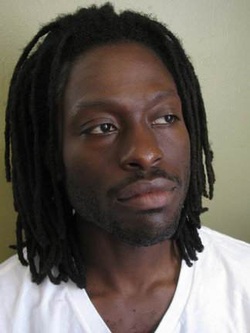 I think it's fantastic that so many writers on this list have recently – or will soon be – coming out with new books. At earlier points in this series, I've mentioned a few I'm looking forward to, and I'd like to add another to the list: Roger Reeves' first collection. The poems I've read of Roger's have in common a voice that is uniquely powerful. Far-ranging in his cultural references and nuanced in the tone he employs, I'm still always struck by the assertive confidence of his speakers. I always get the sense that Reeves knows he has a right to be here, and heard. And with this kind of visceral lyric, I agree: give this man a crown. The following poem will appear in King Me. * Some Young Kings The Mike Tyson in me sings like a narwhal minus the nasally twang of sleeping in a cold ocean, the unsightly barnacles latched to the mattress of skin just below my eye, the white horn jutting out from the top of my head-- oh god bless us mutts—the basset-blood- hound mulattoes, the pug-mixed puppies left behind the dog pound’s cinder-block walls as German Shepherds, Labradoodles, and Portuguese Water-Dogs turn their inbred behinds and narrow backs at our small-mouthed blues. It’s hard to smile with an ear in your mouth, two names, and a daughter hanging by a thread from the railing of a treadmill. Oh neck and North Carolina and a white coat of paint for all the faces of my negro friends hanging from trees in Salisbury. Greensboro. And Guilford County. The hummingbirds inside my chest, with their needle-nosed pliers for tongues and hammer-heavy wings, have left a mess of ticks in my lungs and a punctured lullaby in my throat. Little boy blue come blow your horn. The cow’s in the meadow. And Dorothy’s alone in the corn with Jack, his black fingers, the brass of his lips, the half-moons of his fingernails clicking along her legs until she howls-- Charlie Parker. Charlie Parker. Charlie Parker. Oz is a man with a mute body on an HBO original show that I am too afraid to watch for fear of finding my uncle, or a man that looks like my uncle, which means finding a man that looks like me in another man’s embrace or slumped over a shiv made from a mattress coil and a bar of Ivory soap. Most young kings return home without their heads. It’s 1941, and Jack Johnson still loves white women, and my mother won’t forgive him. If she can’t use your comb, don’t bring her home, my mother says in 1998. It’s 2009, and I still love white women. Charlie Parker. Charlie Parker. Charlie Parker. Often, I click the heels of my Nikes together when talking to the police, I am a cricket crushed beneath a car’s balding black tires. Most young kings return home without their heads. * Roger Reeves's poems have appeared or are forthcoming in journals such as Poetry, Ploughshares, American Poetry Review, Boston Review, and Tin House, among others. Kim Addonizio selected “Kletic of Walt Whitman” for the Best New Poets 2009 anthology. He was awarded a 2013 NEA Fellowship, a 2013 Pushcart Prize, a Ruth Lilly Fellowship by the Poetry Foundation in 2008, two Bread Loaf Scholarships, an Alberta H. Walker Scholarship from the Provincetown Fine Arts Work Center, and two Cave Canem Fellowships. Recently, he earned his Ph.D. from the University of Texas and is currently an assistant professor of poetry at the University of Illinois, Chicago. His first book, King Me, is forthcoming from Copper Canyon Press in October 2013. 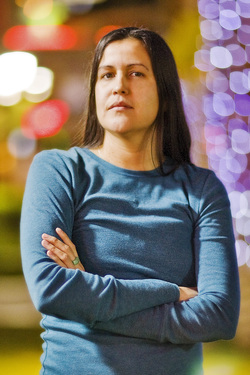 As a devoted reader and student of poetry, I sometimes find myself obsessed by the mechanics of poems: what, exactly, makes any given poem work? How does any given poet use any given craft element to her benefit? Some of us can write movingly in a more intuitive fashion, without ever wondering out loud what makes our poems work, and some of us are compelled to ask, again and again. I don't know Natalie Diaz personally, but I saw her speak on a panel at the Brooklyn Book Festival a few weeks ago, and I got a good impression of her highly exacting mind. I loved how seriously she considered the questions posed her, and the intelligence of her answers. Before that, though, I had the chance to read some of Diaz's wonderful poems. If I had to pick my favorite aspect of her style, image would come out on top. Diaz's imagery is remarkable. When she creates a picture or an icon, it's gorgeous, important, and resilient. Image is one of the cornerstones of great poetry, and Diaz is establishing herself as a master of this element. This is one of many things she does well, of course - but I find myself savoring the resonant sensations her poems impart days and weeks later, and I hope they'll thrill you, too. The poem below was previously published in Diaz's book, When My Brother Was an Aztec, published by Copper Canyon Press. * When the Beloved Asks, “What Would You Do If You Woke Up and I Was a Shark?” My lover doesn’t realize that I’ve contemplated this scenario, fingered it like the smooth inner iridescence of a nautilus shell in the shadow-long waters of many 2 a.m.s—drunk on the brine of shoulder blades, those pale horns of shore I am wrecked upon, my mind treading the wine-dark waves of luxuria’s tempests-- as a matter of preparedness, and because I do not sleep for fear of such things, and even other things—I’ve read that the ocean is a large pot of Apocalypse soup soon to boil over with our sins-- but a thing is a thing, especially if it’s a 420-million-year-old beast, especially if you have wronged as many as I. Beauty, it is simple, more simple than a beloved can imagine: I wouldn’t fight, not kick, flail, not carry on like one driven mad by the black neoprene wetsuit of death, not like sad-mouthed, despair-eyed albacore nor blubbery pinnipeds, wouldn’t rage the city’s flickering streets of Ampullae of Lorenzini, nor slug my ferocious, streamlined lover’s titanium white nose, that bull’s-eye of cartilage, no, I wouldn’t prolong it. Instead, I’d place my head onto that dark altar of jaws, prostrated pilgrim at Melville’s glittering gates, climb into that mysterious window starred with teeth—the one lit room in the charnel house. I, at once mariner, at once pirate, would navigate my want by those throbbing constellations. I’d wear those jaws like a toothy cilice, slip into the glitzy red gown of penance, and it would be no different than what I do each day—voyaging the salt-sharp sea of your body, sometimes mooring the ports or sighting the sextant, then mending the purple sails and hoisting the masts before being bound to them. Be-loved, is loved, what you cannot know is I am overboard for this metamorphosis, ready to be raptured to that mouth, reduced to a swell of wet clothes, as you roll back your eyes and drag me into the fathoms. * Natalie Diaz was born and raised in the Fort Mojave Indian Village in Needles, California. She is Mojave and an enrolled member of the Gila River Indian Tribe. She was part of the Old Dominion Lady Monarch basketball team that made it to the NCAA Championship game in 1997. After playing professional basketball in Europe and Asia for several years, Diaz returned to Old Dominion and completed a double-MFA in poetry and fiction. Her first poetry collection, When My Brother Was an Aztec, was published by Copper Canyon Press in May of 2012. She was awarded a 2012 Lannan Literary Fellowship, the 2012 Narrative Prize from Narrative Magazine, and a 2012 Native Arts & Culture Foundation Artist Fellowship. Diaz is part of the IAIA low residency MFA faculty in Santa Fe and currently lives in Mohave Valley, Arizona, where she directs the Fort Mojave Language Recovery Program, working with the last remaining speakers at Fort Mojave to teach and revitalize the Mojave language.  Brevity is overrated. I love a fine tweet as much as the next gal, but occasionally, I wish more poets would dare to be oceanic, to swarm and envelop me with their words instead of throwing a small polished stone in my general direction. John Paul Davis is a great poet to read in moments like these. There's a Whitmanesque quality to his poems, effusive and generous – and characterized by endless fascination. Like Whitman, Davis is enraptured by the people he encounters, and inspired by them. I first met Davis a few years ago in Chicago: he was my neighbor, and we also worked creatively together. During those times, what always came through for me first was his curiosity about other human beings, how he sparkled and leaned in when he had a question or a quip, and how much he cared about representing the people he knew well. His poems have the same emotive engine: they expand, and thrum. Davis is a fascinating, underrated poet. Please enjoy this small example of what he can do. * In Praise Of Loud Women Starting with the ones at the poetry open mic shows but not just those under the spotlight, also the bartender with the lightning-sharp laughter who hushes the chattering men camped on barstools when the next reader taps the microphone & unfolds the looseleaf from her pocket & there's the ones with glitter eyeliner & skin-tight mini skirts on the subway filling the car with with the nasal music of their hopes & gossip while we tunnel beneath the East River toward Brooklyn & thank you for all of them, they have made my favorite days like that Saturday moving from bar to bar with Lynne & Tish & Syreeta giving me the side eye & Lizz met us & the stories only got louder, & I consider myself lucky to have so often heard Marty's hard-earned wisdom & prosody reverberate through an entire room & Rebecca's warm contralto speaking fragments of Chekhov, Elizabeth in arms about some new political injustice on tv & Chelsy, who bit my wrist to let me know she liked me & even Alecia rattling my mobile phone with her anger, her name will never stop meaning light & could I have listened to her with more of myself & Paige, famous for starting arguments on the internet called me delightful & Rae's Ohio drawl ricocheting up & down the river assuring me I was home & Mahogany's redbone Oakland syllabics making everything into song & Emily Rose trying to talk some sense into my thick head late on one of those bitterly cold Chicago nights driving & smoking with the windows down & Adri coaching me through the grief when I tell her what the doctors have said is happening to my stepmother who could make my short name multisyllabic when I was not my best self & who taught me to want to make the good kind of trouble & she is dying & no one knows how long she has & this unjust world will lose her unrepeatable voice, so many rooms will no long resound when her Southern vowels crest brightly as she tells some story, how will the world get by without her faith & her willingness to take on the small difficult work that brings about real change & I don't think I could have become a man without her, she required grace & patience & compassion & honesty from me & what will I do without her to trouble me & tell me, what trouble can I make to make & maintain space for such blessed loudness as hers, promise me that more loud talking big laughing bold troublemaking women are stepping in to fill the empty places, what kind of light can I shine when one such woman breathes to speak & what kind of ear should a stubborn know-it-all thick man grow what kind of silence should I be learning what kind of silence what kind of silence? * John Paul Davis is a curator of Page Meets Stage. He was a founding member of Real Talk Avenue, and is the former editor of Bestiary Magazine and Em Literary. He currently lives in Brooklyn. His website is www.johnpauldavis.org 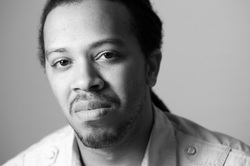 As a poet often obsessed with structure, allowing a poem to have its own way with me can sometimes be a challenge. It can be hard to relinquish control of an idea – although an idea, by its nature, is intangible. But Kenyatta Rogers is a poet with a wonderful sense of flow. My favorites among his poems tend to be associative, with connective tissue that's more intuitive than logical. To write a poem of this sort requires a highly attuned awareness of balance, and an acceptance of the fact that sometimes the poem wants to become something greater than even the creator might anticipate. Rogers has these qualities in full. The work I've chosen to include is one of my favorite list poems - versatile, funny, challenging and saddening by turns. With Rogers, you never quite know what you're going to get – but the surprise is always welcome. I'm looking forward to great things from Rogers in the next few years, and so should you. The poem below was previously published in Court Green. * Purple Music I had a dream about Thelonious Monk and in that dream I told him I missed him I told him I miss him . . . I missed him the beautiful ones you always lose the gargoyle ate them all all of them . . . he ate them I threw anything I could find rocks, I threw rocks I threw shoes I threw lamps I threw a table brick and mortar and dirt and towels I threw my mom I threw my mom I threw chairs bubble gum tables light bulbs lamps trees big blocks of wood small pills of aspirin I pulled up turnips And I threw turnips like Princess Toadstool I threw turnips thoughts and pictures and metaphors I jumped in the Atlantic and picked up the Amistad and I threw the whole fuckin Amistad and I threw bubblegum Gabriel helped me throw Metatron and then I threw Gabriel I threw purple I took small tufts of clouds and I threw clouds and 33 and a thirds and jewel cases spit hair nails caskets crucifixes chunks of cement Abraham Lincoln’s right eye the bullet that shot Franz Ferdinand Kennedy Malcolm Martin Pac Christopher Mahatma the one that started the revolution which will be televised along with the TV. I threw 1080p and 720 and standard definition and mayors and hubcaps projectors asbestos the football lock combinations and bubble gum did I say I threw the bubble gum it was 1989 and I threw bubble bum I once threw a Bible through a plate glass window and it went all the way to Tehran and this guy caught it and pissed on it and he burned it and he ate it and he shit it out all in about 15 minutes it goes through the system fast . . . * Kenyatta Rogers was the 2012-2013 Visiting Poet in English, at Columbia College Chicago where he also earned his MFA in Creative Writing Poetry. He is a Cave Canem fellow and was also a Poet-in-Residence for the Hands on Stanzas program through the Poetry Center of Chicago. His work has been previously published in or is forthcoming from Jubilat, Court Green, Reverie, Vinyl, Black Tongue Review, Cave Canem Anthology XIII, among others. He works as a teaching artist and still lives in Chicago. |
Archives
December 2021
Categories |

 RSS Feed
RSS Feed